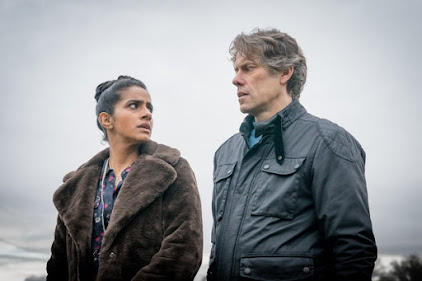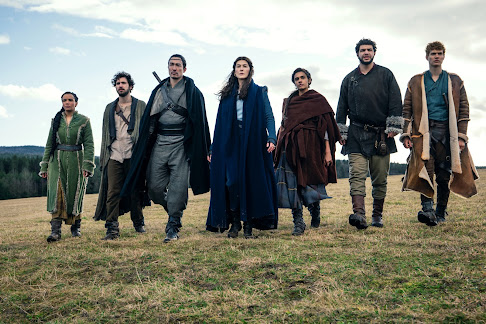The Doctor has narrowly averted the destruction of the entire universe and has found a clue to the identity of the mysterious enemies opposed to him: the Silence. His attempts to track down the Silence lead him to the shores of a remote lake in Utah and apparently his own death. He now has two centuries to find out what this enemy is, how to stop them and to embrace the inevitability of his own mortality.

Doctor Who's sixth series marks a series of unusual shifts in the format the show has employed since it returned in 2005. It aired in two parts, with a three-month gap between the seventh and eighth episodes, meaning that the production team decided to a big "mid-season cliffhanger" more comparable to the end--of-season finale in scope and scale. It also continued the story arc from the preceding season, rather than ending it and delving into a new mystery for this season. The season is much more heavily serialised than any season before it (in the reboot era, anyway) and, arguably, any season following (at least until the recent Series 13). This is both good, giving the show an epic scale and scope unlike anything we've seen before, and bad, since the serialised storyline is so convoluted that the emotional heart of the story often goes missing.
Things start off well with the 2010 Christmas Special, A Christmas Carol. The first Christmas Special produced under Moffat's tenure, it is charmingly written and splendidly acted by its two main guest stars, Michael Gambon and Katherine Jenkins. The episode has a nice fairy tale quality to it, which encourages you to ignore the rather blatant rewriting of the show's rules (well, guidelines) on time travel and the oddness of all the flying fish. A solid episode, even if it feels a bit rude in how it shunts Rory and Amy to one side so it can continue the tradition of having a one-off Christmas companion.
The Impossible Astronaut and Day of the Moon form an effective, epic opening to the season. Doctor Who was at the zenith of its popularity in the United States at the time and the episodes feature significant location filming in the actual USA, which gives the story an widescreen, cinematic feel. There's some nice inversions of expectations - the Doctor turns out to be good friends with Richard Nixon, of all Presidents - and a superb guest starring turn by Mark Sheppard (and a nice cameo by his father, W. Morgan Sheppard, cleverly playing an older version of the same character). The two-parter doesn't quite hang together: the shock of seeing the Doctor killed is offset by the realisation that that happened to a version of the Doctor from 200 years in the future, meaning you assume he'll come up with some clever timey-wimey way of avoiding that fate, which turns out to be pretty much the case. It's also another story that borrows heavily from Paul Cornell's superb New Adventures novels - wherein a young child in a spacesuit apparently kills the Doctor, creating chaos - without Cornell getting any credit, which is weird. The Silence are also not quite as cool an enemy as Moffat seems to think they are (and they turn into another monster with a killer app feature that is rather easily defeated by two minutes of common sense). Fun, watchable but another story where Moffat's writing starts circling his own posterior, a risk of being sucked up into it at any second but just managing to steer clear.
Rather jarringly, the show then moves to depicting a series of stand-alone adventures. The Curse of the Black Spot should be fun - Doctor Who does pirates! - and Hugh Bonneville gives a superb guest performance, but obvious budget constraints drain the vitality from the story and Lily Cole has absolutely nothing worthwhile to do.
The Doctor's Wife marks the first script written by Neil Gaiman and it's a winner, working on the idea that the Doctor's TARDIS is inadvertently incarnated in the body of a young woman, allowing the Doctor to literally communicate with his ship for the first time ever. It's a fun idea and the sparkling dialogue between Idris (an outstanding performance by Suranne Jones) and the Doctor, and the exploration of their emotional connection, gives the episode tremendous weight. It is let down by taking too long to get to the moment when the Doctor realises who Idris is and then rather easily defeats what should have been a much more formidable enemy than normal, House (voiced by Michael Sheen), a consumer of dead TARDISes. Still, one of the season's two outstanding episodes.
The two parter of The Rebel Flesh and The Almost People is highly promising with an excellent cast (Life on Mars's Marshall Lancaster, At Home with the Braithwaites' Sarah Smart and Downton Abbey's Raquel Cassidy's Cleaves) and a fascinating premise, where doubles of people turn out to be as much people as the originals, but then doesn't do much with it. Like far too many 1970s episodes of Doctor Who, a great idea is introduced and then devolves into running around a lot of corridors whilst the ethical implications of the idea are somewhat confusedly explored. The ending indicates the true purpose of the story: to set up one of Moffat's "gotcha!" moments of playing a huge trick on the audience. It's a relatively good ending, to be fair, but the fact that the two-part story you've just watched is simply setup for a completely different story makes the two-parter feel underwhelming. Not to mention that there is no reason whatsoever for this to be a two-parter, it could have been a one-off episode easily.
Moffat's over-arcing season megastory gets revisited into the two-part mid-season epic. The first half is infinitely the superior of the two. A Good Man Goes to War features the Doctor assembling a hardcore rumble squad of some of his most skilled and infamous allies (at least from earlier in this season and the one before) to launch an attack on the aliens who've been secretly holding his companion prisoner for months. It's a fun episode with lots of great lines, some fascinating ideas (like the Headless Monks) and some phenomenal characters, particularly the first appearance of the Paternoster Gang (Vastra, Jenny and Strax) who steal every scene in their in. The last-minute plot reversal twist is exceptional and the whole thing moves fast.
Unfortunately, the show almost immediately resolves this twist in Let's Kill Hitler, a messy episode which tries to explain some very complicated ideas in 45 minutes whilst also throwing in the Third Reich, River Song and scores of Nazis. The very perfunctory resolution to Amy and Rory losing their child is unconvincing at best, and River Song's origin story ends up being convoluted past the point of being interesting.
Night Terrors starts getting back on track with the Doctor helping solve a young boy's nightmares with the help of Ashes to Ashes' Daniel Mays. A fun but slight story, followed up on by The Girl Who Waited. Karen Gillen gives an absolute acting masterclass, dual performance in an episode which I assume won her her role as Nebula in the Marvel Cinematic Universe by itself. The highlight of the season, with a strong emotional arc.
The God Complex is one of those "creepy hotel" stories that cash-strapped SF series do from time to time, and like Star Trek: The Next Generation's The Royale, it ends up being a bit tedious with a rubbish monster and a baffling callback to one of the worst Doctor Who stories of all time (The Horns of Nimon), despite some excellent guest performances.
Closing Time is a sequel to the previous season's The Lodger, but is perked up by James Corden giving a better performance and the Doctor's amusing partnership with baby Alfie, aka Lord Stormageddon. It's also one of the better Cyberman stories since the show's comeback in 2005, let down (and I admit this is a personal thing) by what is blatantly Cardiff standing in for my home town of Colchester (seriously, it's three hours away, couldn't they have done like a single afternoon's filming here or something).
The Wedding of River Song sets itself the task of wrapping up Steven Moffat's convoluted two-season-spanning arc, which it only half-achieves. Resolving the cliffhanger from the first episode is far more simplistic and obvious than expected, and the episode ends up feeling a bit of an anti-climax considering it's trying to pay off the last two seasons' worth of mysteries. However, there's fun to be had by seeing Ian McNeice as "Holy Roman Emperor Winston Churchill" and the Doctor trying to obscure his own history.
The sixth series of the resurrected Doctor Who (***½) is solid but overwrought, building up a major story arc that is resolved rather simplistically and neatly (though setting up the following season's storyline at the same time). There's some good episodes and some fine ideas, but also the feeling that maybe the show should stop being about its titular character and get back to the Doctor being someone who shows up and helps other people out in times of crisis, rather than orchestrating byzantine schemes across multiple timelines. The season is currently available in the UK via the BBC iPlayer and in the USA via HBO Max.
6X: A Christmas Carol ****
601: The Impossible Astronaut ***
602: Day of the Moon ***
603: The Curse of the Black Spot ***
604: The Doctor's Wife ****½
605: The Rebel Flesh ***
606: The Almost People ***
607: A Good Man Goes to War ****½
608: Let's Kill Hitler ***
609: Night Terrors ***½
610: The Girl Who Waited *****
611: The God Complex ***
612: Closing Time ***½
613: The Wedding of River Song ***½



















